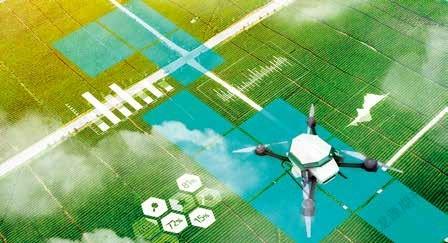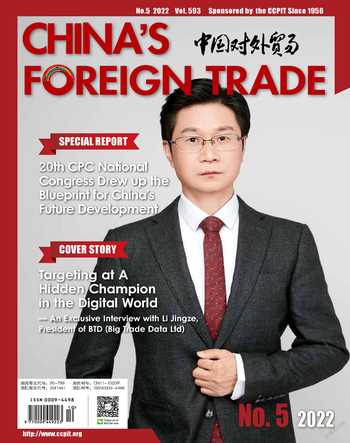Digital Technology Promotes China-foreign Trade in Agricultural Services
By Jenny Hu

“At present, the pace of agricultural and rural modernization construction is constantly accelerating, the trade of agricultural products has achieved new highs, and the international agricultural cooperation has achieved positive results. According to statistics, over the past five years, Chinas agriculture, forestry, animal husbandry and fishery industry have attracted accumulated foreign capital and conducted foreign investment in amounts of USD 3.83 billion and USD 9.31 billion respectively. The foundation of agricultural service trade development has been consolidated constantly with broad prospects and huge potential,” pointed out Sheng Qiuping, Vice Minister of the Ministry of Commerce at the first International Conference on Trade in Agricultural Services, which was held not long ago at the 2022 China International Fair for Trade in Services.
Strengthen international cooperation in agriculture
In recent years, China has made great efforts to develop socialized agricultural services. Through subject cultivation, model innovation, field expansion, resource integration, industry norms and typical demonstrations, China has effectively promoted the upgrading and improvement of the quality and efficiency of agricultural services. China has been actively expanding its all-round opening-up, including agricultural services, expanding market access and improving the business environment to provide opportunities for the growth of overseas invested enterprises.
Ma Youxiang, Vice Minister of Agriculture and Rural Affairs, made the point that we should accelerate the opening up of the system and make the piece of pie of trade in agricultural services bigger: “We will strengthen innovation and improve the quality of trade in agricultural services. We will also optimize the pattern of development, share the dividends of trade in agricultural services; and integrate more countries and regions into global trade in agricultural services. Exchange platforms will be built to strengthen cooperation in the agricultural service trade. The International Conference on Trade in Agricultural Services will also be institutionalized to build a platform for exchanges and cooperation, and will jointly promote the highquality development of global trade in agricultural services.”
As for the changes that have taken place in China over the past 40 years, William Cohen, Chairman of the Cohen Group, said that in just 40 years, China-U.S. economic and trade relations have undergone earth-shaking changes, and China and the United States have formed a win-win situation in agriculture. American farmers produce large quantities of agricultural products which can be used to meet the needs of the Chinese people, and from which American farmers have benefited a lot.

“Especially in my hometown of Maine, agricultural trade with China is so important for American farmers to be able to sell products and services, feed their families, and reinvest in agricultural activities. At the same time, the Chinese people also gain access to high-quality and nutritious agricultural products as well as satisfactory services,”Cohen pointed out. He also explained that although there are currently still some issues to be faced between the two countries, people should keep in mind that China has become one of the most important countries for the United States in terms of its trade position, as well as for any other country in the world.
American agricultural exports to China exceeded USD 38 billion in 2021, up by more than 20% compared with that in 2020. “From that point of view, I hope there will be more prosperous trade, better relations and more win-win situations between our two countries, where our people may enjoy the opportunities and benefits of each others hard work and full consumption,” elaborated Mr. Cohen.
At present, the global COVID-19 pandemic is still experiencing ups and downs, the worlds economic recovery is weak, and the global food market is fluctuating. In order to strengthen international cooperation in agriculture and safeguard world food security serves the common interests of people in all countries.
Agricultural industrial cooperation between China and foreign countries has developed rapidly
Trade in agricultural services plays a significant role in improving the agricultural production efficiency and accelerating agricultural modernization, and is of great significance to promoting sustainable international agricultural development and ensuring global food security. For all countries and regions, the development of the agricultural service trade is an inherent requirement and an important step towards achieving agricultural transformation and upgrading.
“Chinas agricultural is developing very rapidly, and the Netherlands has a lot of cooperation with China in this area. The Netherlands has for many years been the second largest agricultural exporter. Trade between China and the Netherlands has exceeded EUR 100 billion in the past year, which is a great success story. This success is attributed to three words: innovation, collaboration and sustainability,” stated Mr. Wim Geerts, Ambassador of the Kingdom of the Netherlands to China, in his speech at the Conference.
The Netherlands is involved in a lot of agricultural cooperation with China. It is reported that a live pig demonstration park which will be established by the Netherlands will be officially launched in Hebei Province in the near future. In this demonstration park, the Netherlands will demonstrate sustainable pig breeding and digital operations, and will further promote the development of family demonstration farms in China. In the seed industry, Dutch companies are also developing innovative and improved varieties in China.
According to Victor Villalobos, Secretary of Agriculture of the United States of Mexico, trade in services is at a turning point and will play a more prominent role in fields such as logistics, consulting, financial services and technology as the global pandemic continues and natural disasters occur more frequently. Therefore, trade in agricultural services has proved to be an important factor in ensuring world food security.
Victor also reiterated that Mexican agriculture has many service sectors that enrich the choices of producers and increase the trade in value added. These public services provide a useful complement to operators in the field of agriculture, livestock, fisheries and aquaculture. At the same time, he also appreciates that China is playing a significant role in the global marketing of agricultural services.
Many Chinese companies have also entered overseas markets through the service trade. Feng Tong, Chairman of Guangdong Agribusiness Group Corporation, said that through trade in services, enterprises may help some developing countries solve the problems of agriculture and poverty. So far, the Corporation has created 15,000 jobs and supported 30,000 jobs in Southeast Asia. In Thailand, the Corporation participated in a local anti-poverty program, which has boosted rubber plantations in the northeast area of the country, with this 60,000-ton project narrowing the wealth gap between the north and the south. The Corporation is integrating with the local culture by training local rubber workers. The “3+2” model in Laos is also helping to increase local peoples incomes and the whole industrial chain is utilized to commercialize the local rubber industry in Malaysia.
Digital technology has brought new impetus to the development of modern agriculture
With the rapid development of information technology, modern information technologies such as the Internet of Things, intelligent equipment, remote sensing monitoring and artificial intelligence have been deeply applied in agricultural production. The knowledgeintensive service industry which is characterized by digitalization and intelligentization has increasingly become the new driving force for the development of modern agriculture.
Sheng Qiuping stated that the new round of scientific and industrial revolutions and the strong rise in digital technology have provided an important driving force for the integrated development of modern agriculture and the modern service industry, and global agricultural services are exhibiting a rapid development momentum.
Anabel Gonzalez, Deputy Director-General of the World Trade Organization (WTO), said that services are at the heart of the digital revolution, which is transforming all aspects of the agricultural industry, including how farmers optimize crop management, resource utilization and product sales. With specialized digital platforms like Pinduoduo and Alibaba which connect all sections of the supply chain, China has become a representative for this trend as e-commerce increasingly gains importance in the domain of agricultural products.
Nowadays, trade in services plays an increasingly prominent role in promoting international trade and has become a fertile ground for strengthening economic and trade cooperation among countries. With the rapid development of global cross-border trade in services, trade in services has provided a powerful approach for the wide application and rapid spread of knowledge and new technologies.
“The cooperation between the two countries in terms of gardening agriculture is driven by technology. In the future, digital applications for flowers, vegetables and seeds will be further strengthened and high-tech planting will be developed,” He Weimin said. “This is also a foundation for innovation in agriculture, and by introducing new technologies, we can promote sustainable and more developed agricultural practices.”
As for how to promote renewable agriculture, Erik Fyrwald, Syngentas CEO suggests that consumers should be able to see sustainable data from products, which may encourage manufacturers to produce what consumers want. The relevant government departments are supposed to conduct training, provide subsidies and help to design products that consumers want for these enterprises. Governments should also work with the industry to measure the carbon content in the soil and provide fast approval services for sustainable and renewable agricultural products.
- China’s foreign Trade的其它文章
- The Development of Foreign Trade in China over Last Decade:Higher-level Opening-up to the Outside World
- New Changes in Travel:Past Visitors Are Become Today’s Experiencers
- China’s Livestreaming Enters A New Phase of Development
- The Pension Industry Calls for New Models and Ecology
- As Shipping Costs“Dive”,It Is Imperative to Improve the Layout of Industrial Chain
- China Manufacture“Prepares”for World Cup

